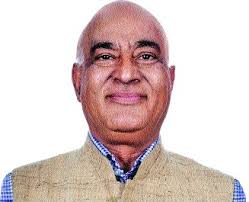Synchronised elections, voter behaviour, and governance outcomes
An active policy proposal of the Government of India is to hold national elections at the same time as the assembly elections of all the states. This article examines whether holding national and stat...
-
 Vimal Balasubramaniam
Vimal Balasubramaniam  Sabyasachi Das
Sabyasachi Das  Apurav Yash Bhatiya
Apurav Yash Bhatiya  28 August, 2020
28 August, 2020
- Articles
Political determinants of newspaper markets in India
Newspapers are an important source of political information for Indian voters. This article looks at how political factors influence the newspaper market. Using the announcement of delimitation in the...
-
 Julia Cagé
Julia Cagé  Guilhem Cassan
Guilhem Cassan  Francesca R. Jensenius
Francesca R. Jensenius  23 November, 2023
23 November, 2023
- Articles
A proposal for public funding of elections and political parties in India
The Finance Minister of India recently introduced measures aimed at cleaning up political party funding in the country. In this article, Gowda and Santhosh highlight the limitations of these measures,...
-
 M.V. Rajeev Gowda
M.V. Rajeev Gowda  Varun Santhosh
Varun Santhosh  21 April, 2017
21 April, 2017
- Perspectives
The tussle between RBI and Ministry of Finance: A different dimension
The popular belief about the tussle between RBI and the Ministry of Finance is that it is an issue of the trade-off between inflation and economic growth, with the former more focussed on controlling ...
-
 Gurbachan Singh
Gurbachan Singh  18 August, 2016
18 August, 2016
- Perspectives
W(h)ither the State? 25 years of economic liberalisation
24 July 2016 marked 25 years of liberalisation of the Indian economy. In this article, Parikshit Ghosh, Associate Professor of Economics at Delhi School of Economics, contends that liberalisation did ...
-
 Parikshit Ghosh
Parikshit Ghosh  26 July, 2016
26 July, 2016
- Articles
Does good governance reduce foodgrain diversion in PDS?
In 2011-12, various states undertook measures to curb leakages of foodgrains from the Public Distribution System. Some of the pioneer states also implemented the National Food Security Act - a rights-...
-
 Sohini Paul
Sohini Paul  24 July, 2016
24 July, 2016
- Articles
When does politics work for development?
Political interference in the bureaucracy is generally viewed with suspicion. Yet, in a democracy, should we not expect politicians to push bureaucrats to work for the best interests of citizens? This...
-
 Saad Gulzar
Saad Gulzar  Ben Pasquale
Ben Pasquale  15 July, 2016
15 July, 2016
- Articles
Does choice of procurement contract matter for cost and quality of infrastructure?
Central as well as state governments in India lack financial resources and expertise needed to provide adequate infrastructure and maintain it. To augment their capacity and effectiveness, government ...
-
 Ram Singh
Ram Singh  30 June, 2016
30 June, 2016
- IGC Research on India
Food Security Act: How are India's poorest states faring?
The National Food Security Act was passed in 2013. This column reports findings from a recent survey on the status of the Act in six of India’s poorest states. Chhattisgarh, Madhya Pradesh, Odisha a...
-
 Jean Drèze
Jean Drèze  Prankur Gupta
Prankur Gupta  Reetika Khera
Reetika Khera  Isabel Pimenta
Isabel Pimenta  29 June, 2016
29 June, 2016
- Articles
Missing the target: NDA's not-so-rosy report card on social policy
In this article, Parikshit Ghosh, Associate Professor of Economics, Delhi School of Economics, assesses the performance of the social sector under the NDA government at the end of two years in office...
-
 Parikshit Ghosh
Parikshit Ghosh  22 June, 2016
22 June, 2016
- Perspectives
‘I Paid A Bribe’: Using technology to fight corruption in India
‘I Paid A bribe’ (ipaidabribe.com) harnesses the collective energy of Indian citizens against corruption by enabling them to report anonymously on the nature, number, pattern, types, location, fre...
-
 Venkatesh Kannaiah
Venkatesh Kannaiah  06 June, 2016
06 June, 2016
- Notes from the Field
The alcoholic mammaries of the welfare State
Tamil Nadu is known to give away more freebies to voters than any other state and these are financed mainly by massive revenues from liquor sales. In this article, Swaminathan Aiyar, Consulting Editor...
-
 Swaminathan Aiyar
Swaminathan Aiyar  30 May, 2016
30 May, 2016
- Articles
Impact of Electronic Voting Machines on electoral frauds, democracy, and development
In an attempt to curb electoral malpractices, Electronic Voting Machines were introduced on a national scale by the Election Commission of India in the 1990s. Using data from state assembly elections ...
-
 Sisir Debnath
Sisir Debnath  19 May, 2016
19 May, 2016
- Articles
The first two years of Modi government
In this article, Pranab Bardhan, Professor of Graduate School at the Department of Economics, University of California, Berkeley, provides his perspective on the performance of the Modi government in ...
-
 Pranab Bardhan
Pranab Bardhan  11 May, 2016
11 May, 2016
- Perspectives
Aadhaar Bill: UID without excessively compromising privacy?
Can something like UID be created without compromising privacy beyond acceptable limits? If so, how should the Aadhaar Bill have been written? What are its specific and avoidable weaknesses?
-
 Jean Drèze
Jean Drèze  Reetika Khera
Reetika Khera  Raju Rajagopal
Raju Rajagopal  06 May, 2016
06 May, 2016
- Perspectives
Twitter feed
Tweets by Ideas4IndiaMost Popular Governance Posts
Unique Health Identification and Aadhaar: A case for mandatory linkage
As part of the Digital India initiative, All India Institute of Medical Sciences (AIIMS) issues a Unique Health Identification (UHID) number to each patient, which documents their entire journey in th...
 Mudit Kapoor
Mudit Kapoor  23 December, 2016
23 December, 2016
- Perspectives
Caste dominance in rural India: Cause and effect
Rural India remains a caste-based society. This column explores why caste continues to play such an important role and what the effects are. It argues that trade and agricultural productivity suffer, ...
 Siwan Anderson
Siwan Anderson  16 August, 2012
16 August, 2012
- Articles
Why did the Indian economy stagnate under the colonial rule?
How did the Indian economy fare under the colonial rule? Is the average Indian significantly better off after Independence? This column examines trends in GDP per capita in order to determine the stan...
 Aniruddha Bagchi
Aniruddha Bagchi  16 September, 2013
16 September, 2013
- Articles





 16 November, 2023
16 November, 2023






